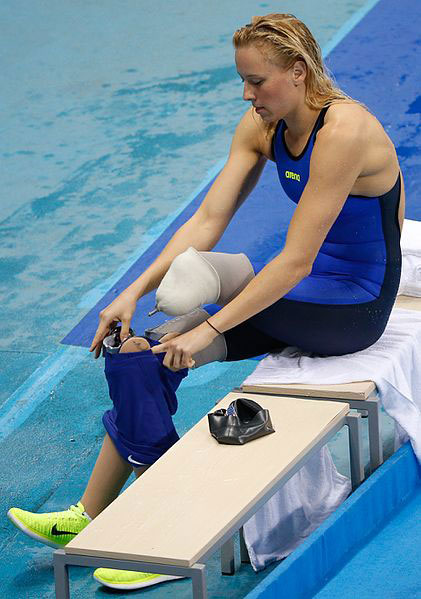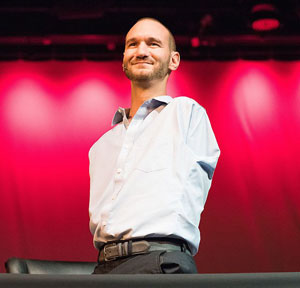It’s been five months since the Super Bowl, but this commercial, featuring American Paralympic swimmer Jessica Long, was by far my favorite ad shown during the game. It was transcendent:
 NBC Sports reports, “Jessica was born in Siberia with fibular hemimelia, which means she didn’t have fibulas, ankles, heels and most of the other bones in her feet. She was adopted by Americans from a Russian orphanage at 13 months old and raised in Baltimore. At 18 months old, her legs were amputated below the knees. She has had more than a dozen surgeries.”
NBC Sports reports, “Jessica was born in Siberia with fibular hemimelia, which means she didn’t have fibulas, ankles, heels and most of the other bones in her feet. She was adopted by Americans from a Russian orphanage at 13 months old and raised in Baltimore. At 18 months old, her legs were amputated below the knees. She has had more than a dozen surgeries.”
Jessica’s life story, including her emotional reunion with her birth parents, is featured in the film Long Way Home.
“When I first see my Russian family, I want them to know that I’m not angry with them, that I’m not upset that they gave me up for adoption,” Long said in the film, before a tearful, hug-filled reunion. “I think that was really brave, and I don’t know what I would have done if I was in her situation, at 16 and having this disabled baby that they knew that they couldn’t take care of. I want to tell her that when I see her that, if anything, I have so much love for her, my mom, because she gave me life.”
What a beautiful prolife story demonstrating the value of each person, no matter their physical challenges. The Bible teaches that each individual is personally created by God (Malachi 2:10). Personhood is never measured by age, stage of development, or mental, physical, or social skills (Exodus 4:11).
 I’m reminded of Nick Vujicic, who was born in 1982, in Melbourne, Australia, without arms and legs. He has lived nearly forty years without the ability to walk, care for his most basic needs, or even embrace those he loves. For twenty years, he has been speaking internationally and has also founded an organization called Life Without Limbs. (Nick is married and the father of four children.)
I’m reminded of Nick Vujicic, who was born in 1982, in Melbourne, Australia, without arms and legs. He has lived nearly forty years without the ability to walk, care for his most basic needs, or even embrace those he loves. For twenty years, he has been speaking internationally and has also founded an organization called Life Without Limbs. (Nick is married and the father of four children.)
It’s fair to say that most children with such disabilities would be aborted. But Nick is one of countless people living meaningful and inspirational lives because they were given the chance and have been raised with sacrificial love. His life has not been easy, and for a time he struggled with thoughts of suicide. But so too have countless people who are not disabled. People are people regardless of the degree of their physical limitations.
A young man born without a left leg and without arms below the elbows says, “When I was born, the first thing my dad said to my mom was that ‘this one needs our love more.’” Not only were these parents just what their son needed, he was just what they needed. Many families have drawn together and found joy and strength in having a child with mental or physical handicaps.
If you asked a disabled person if they wish their parents would have aborted them, what response would you expect? If you asked the parents of disabled children if they wish their children had never been born, what would you think they’d say? Who is better qualified than the disabled and their parents to address the issue of whether children should be aborted because of disabilities?
Does this mean caring for a disabled child and seeing her suffering and struggles isn’t extremely difficult? No, of course not. But hope and beauty in difficult situations are often only seen and appreciated in the rearview mirror.
Browse more prolife articles and resources, as well as see Randy’s books Pro-Choice or Pro-Life: Examining 15 Pro-Choice Claims, Why ProLife? and ProLife Answers to ProChoice Arguments.Photos: Wikimedia Commons




